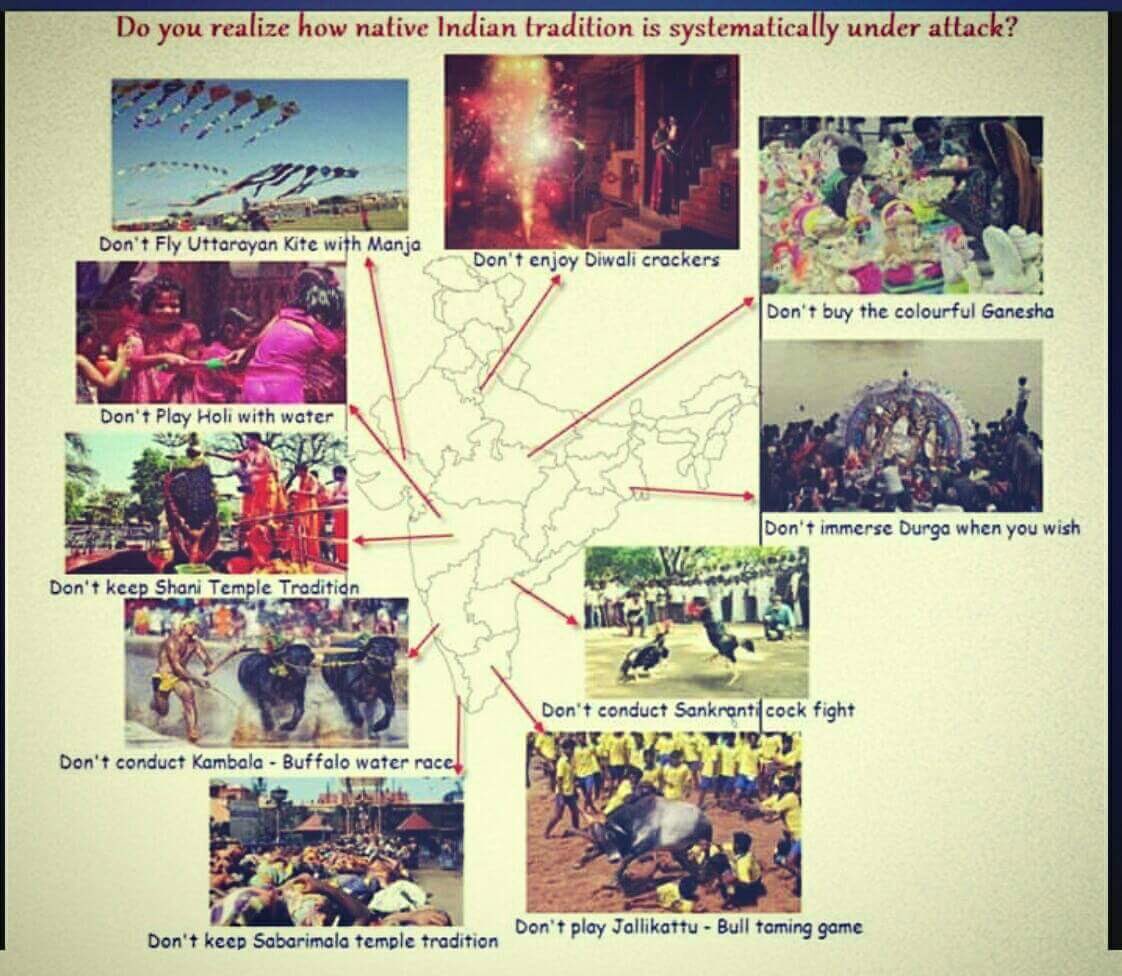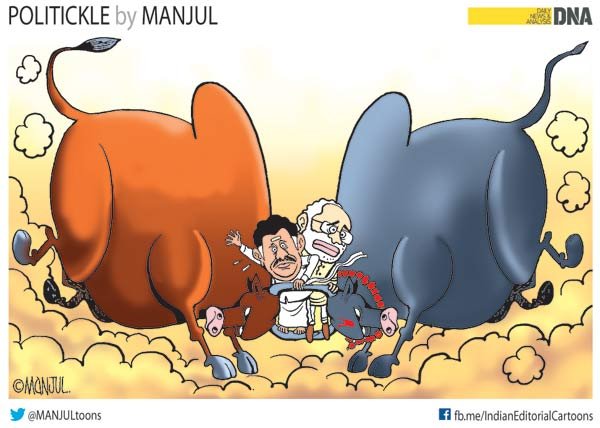True! Why there is attack on Hindu culture, tradition & way of life??
The great game in Jallikattu
By Sankrant Sanu
Some months ago, I had written about Project Thessalonica, an evangelical project that systematically aims to attack Hindu festivals and institutions. Tamil Nadu is a major battleground for the Church where it is has been able to establish deep institutional control. The battle for Jallikattu has to be seen in that light.
What is Project Thessalonica?
“Project Thessalonica aims to stop or limit Hindu activity by converting people, who form the pillars of Hindu culture, festivals, traditions and activity…They are making environmental groups raise the voice so that Ganesh processions, Kumbh Melas and Jagannath Rath Yatras are limited…”[1]
Native festivals are part of a social ecosystem that binds people to native traditions. This is one reason native festivals have always been attacked as part of establishing Christian dominance. Let us look briefly at the timeline for the Jallikattu ban.
In 2006, a judge in the Madras High Court suo moto banned Jallikattu, even though she was hearing an entirely different case and no one had petitioned against the ban.
As, The Hindu reported, based on the lawyer Shaji Chellan’s interview [2]:
“Pointing out that he had actually filed a writ petition seeking permission for rekla (bullock cart) race at Thaniankootam in Ramanathapuram district, the lawyer claims that Justice R. Banumathi (now a Supreme Court judge) expanded the scope of the case on her own and banned rekla race, oxen race and jallikattu.
‘…High Court had already allowed similar writ petitions and granted permission for rekla race in other districts. To my rude shock, Ms. Justice Banumathi took a differing view and questioned how could such races be conducted against the provisions of Prevention of Cruelty to Animals Act,’ he recalls.”
Not only did the Judge on her own add Jallikattu to the case, she also overturned the precedence of earlier judgments to ban multiple festivals in one go. The judgment itself was passed, without any notice, and without allowing anyone in favor of Jallikattu to plead.
Mr. Chellan says the judgment was passed immediately after lunch break on the day of admission itself without notice being issued to any party.
Who was this judge, and how did she manufacture a judgment out of thin air? The Judge is Justice R Bhanumati, and according to an article in VigilOnline, she is a Christian.[3] However, that does not automatically imply any kind of bias, unless such bias is evident in her work. Apart from unilaterally banning Jallikattu, without any petition to do so, Justice Bhanumati appears to have passed harsh judgements on other Hindu matters as well.
Justice Bhanumati ruled against the right of Podhu Dikshidhars, traditional Hindu priests at the fifth-century Natarajar Temple at Chidambaram to manage their own affairs.
“In February 2010, she justified the government takeover of the administration of the famous fifth-century Natarajar temple in Chidambaram saying, ‘Administration of temple is purely secular and the state can intervene and regulate the administration if the secular activities of the institution are mismanaged.’ The judgment, however, was overturned by the Supreme Court earlier this year.”[4]
The Supreme Court found reason to overturn her judgment in the Natrajar temple case. Another exceedingly harsh judgment was passed by Justice Bhanumati against a Hindu Sadhu,
“Making it clear that he would not be eligible for any remission or early release, she said in the judgment that he would serve his second life term after completion of the first life sentence. The order was meant to keep the godman in jail forever. He died in jail in February 2011.”
In yet another case, Justice Bhanumati ruled against grandparents, who sought custody of a child, who was allegedly being converted into Christianity by the other grandparents, when her Hindu parents died.[5]
Without trying to impugn on the motives and judgment of Justice Bhanumati, there is at least prime facie evidence that her extraordinary intervention to ban Jallikattu, without any petition, may be part of an intolerance towards Hindu festivals and institutions, reflected in Project Thessalonica.
While a regulation was passed by the TN government to circumvent the Madras High Court ban in 2009, the Congress Party’s role in this has been equally dubious. In 2011, Congress’ Environment Minister, Jairam Ramesh, banned the use of bulls in sports, with an eye to ban Jallikattu.
“Chairperson, Humane Society International, Nandita Krishna said that by its historic verdict, the Supreme Court has vindicated Ramesh’s position and upheld the ban. ‘I must particularly mention and thank Ramesh who, as Minister for Environment and Forests, banned the use of bulls as performing animals in 2011’.[6]”
While the UPA government was still in power, the Supreme Court, in its subsequent order in 2014 banned Jallikattu altogether[7].
Waking up late, it was not until January 2016 that the BJP government was able to pass a notification reversing the earlier one from 2011, promulgated by Jairam Ramesh of the Congress, and allowing Jallikattu to take place. However the Supreme Court, despite a heavy case backlog of nearly 50,000 pending cases, over a thousand of which are pending for over 10 years[8], decided that it must urgently protect bulls from their owners and stayed the regulation.
In May 2016, the Congress Party, in its manifesto in Tamil Nadu, perhaps with an eye on evangelical support, specifically included upholding the ban on Jallikattu.[9]
The Congress which is criticising the Narendra Modi Government for the ban on Jallikattu, had in its manifesto for the Tamil Nadu Assembly Election in May 2016 had declared that it would ban the Jallikattu. “The party supports the ban on Jallikattu,” said the Congress manifesto.
“Tamil Nadu Assembly elections 2016: Congress releases manifesto, promises ban on Jallikattu”, the dailies had carried banner headlined reports the day after the manifesto was released by Mukul Wasnik, AICC general secretary.
Former PM Manmohan Singh, in a letter to NG Jayasimha, managing director, Humane Society International, a NGO based in Secunderabad had said that he was for banning the bull fight. “The Humane Society Internationale India has a worthy objective and certainly we have to work to discourage bullfights which provide a cruel form of entertainment. I wish you all success in achieving your objective,” said Manmohan Singh in his letter dated December 15, 2015.
Note that Human Society International is another foreign-funded NGO, just at PETA, both of which were major advocates for the ban.
The case against Jallikattu was pleaded by Congress leader Abhishek Singhvi, who called the sport “wanton torture[10]” leading the Supreme Court reinstated the ban in July 2016.
Other questions that arise
Apart from the role of the Congress Party, the part played by the Courts and the nexus between the Courts and foreign-funded NGOs also comes under scrutiny. The Supreme Court judge, KS Radhakarishnan received the PETA man of the year award for his 2014 judgment banning Jallikattu.
The language used in the judgment is also instructive[11]: “international community should hang their head in shame, for not recognizing their rights all these ages, a species which served the humanity from the time of Adam and Eve.”
First, we should be clear that the Supreme Court is a colonial institution. While English Common Law is based on centuries of English traditions, the Indian Constitution and Laws have little or no relation with Indian traditions. Indeed they are antithetical to these. The Supreme Court operates only in English, a grave injustice in a land where less than 10% people know English with any degree of proficiency. It also looks upon the Indian tradition with colonized eyes. As such it is easy prey for the “rights” discourse pushed by foreign-funded NGOs.
Second, it is important to understand why attacking Hindu festivals and traditions is important to the Conversion War. Unlike Book religions, which coalesce around Church or Mosque, driven by monotheistic zeal of insider and outsider, native traditions have no such glue. The glue that there is, is present in festival and ritual, and the same festival will have diverse expressions throughout India. Where it is Pongal in one, it is Lodhi in another and Makar Sankranti in a third area. Attacking these festivals is an attempt to cut these bonds; a rootless people are a much easier target for the conversion war.
Third, Jallikattu is not just a sport, it is an ecosystem that sustain indigenous bovine breeds and values male calves that may otherwise be slaughtered. The fight against Jallikattu has a veneer of animal rights, but the reality is the ban will create slaughter and extinction. This is a result of the lopsided ideological “rights” discourse that the West generates, quite different from the natural harmonious native balance that it seeks to destroy. There is a good thread on this here.
As far as PETA goes, its endorsement of the veal-eating Pope Francis as “Man of the Year” should be enough.
Acknowledgments. Thanks to @a_r_j_u_n and @vivekbabaji for links on Twitter and an unattributed picture with a timeline sketch.
References-
1.
http://heritagefoundation.org.in/Download/articles/can_hindusim_project_thessalonica.pdf
2.
http://www.thehindu.com/news/cities/Madurai/Lawyer-reminisces- the-day-
3. jallikattu-was- banned-first/article17039812.ece
4.
http://www.vigilonline.com/index.ph...-control-over-temple&catid=86:judiciary-watch
5.
http://timesofindia.indiatimes.com/...man-SC-judge-from-TN/articleshow/40221484.cms
6.
https://indiankanoon.org/doc/1949713/
7.
http://www.ndtv.com/south/jairam-ramesh-welcomes-ban-on-use-of-bulls-for-jallikattu-event-560633
8.
https://awbi.org/awbi-pdf/sc_judgement_jallikattu_7-5-14.pdf
9.
http://pib.nic.in/newsite/PrintRelease.aspx?relid=137291
10.
http://www.dailypioneer.com/nation/we-support-ban-on-jallikattu-cong-2016-may-manifesto.html
11.
http://www.timesnow.tv/india/video/...anton-torture-says-abhishek-manusinghvi/54391
12.
http://www.livelaw.in/former-sc-judge-k-s-radhakrishnan-awarded-peta-man-year-award/
Sankrant Sanu
Sankrant Sanu is an entrepreneur, author and researcher based in Seattle and Gurgaon. His essays in the book “Invading the Sacred” contested Western academic writing on Hinduism. He is a graduate of IIT Kanpur and the University of Texas and holds six technology patents. His latest book is “The English Medium Myth.” He blogs at
sankrant.org .





